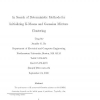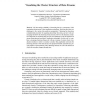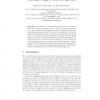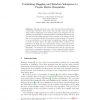89
Voted
IDA
2007
Springer
15 years 28 days ago
2007
Springer
The performance of K-means and Gaussian mixture model (GMM) clustering depends on the initial guess of partitions. Typically, clus∗ corresponding author 1
IDA
2007
Springer
15 years 28 days ago
2007
Springer
90
Voted
IDA
2007
Springer
15 years 7 months ago
2007
Springer
The paper presents new developments in an extension of Codd’s relational model of data. The extension consists in equipping domains of attribute values with a similarity relation...
IDA
2007
Springer
15 years 7 months ago
2007
Springer
In this paper, we present two ensemble learning algorithms which make use of boostrapping and out-of-bag estimation in an attempt to inherit the robustness of bagging to overfitti...
IDA
2007
Springer
15 years 7 months ago
2007
Springer
134
Voted
IDA
2007
Springer
15 years 7 months ago
2007
Springer
The increasing availability of streaming data is a consequence of the continuing advancement of data acquisition technology. Such data provides new challenges to the various data a...
IDA
2007
Springer
15 years 7 months ago
2007
Springer
We present a new machine learning approach to the inverse parametric sequence alignment problem: given as training examples a set of correct pairwise global alignments, find the p...
IDA
2007
Springer
15 years 7 months ago
2007
Springer
Random forests are one of the best performing methods for constructing ensembles. They derive their strength from two aspects: using random subsamples of the training data (as in b...
104
click to vote
IDA
2007
Springer
15 years 7 months ago
2007
Springer
Abstract. Finite mixture models can be used in estimating complex, unknown probability distributions and also in clustering data. The parameters of the models form a complex repres...
119
Voted
IDA
2007
Springer
15 years 7 months ago
2007
Springer
The Denclue algorithm employs a cluster model based on kernel density estimation. A cluster is defined by a local maximum of the estimated density function. Data points are assign...





